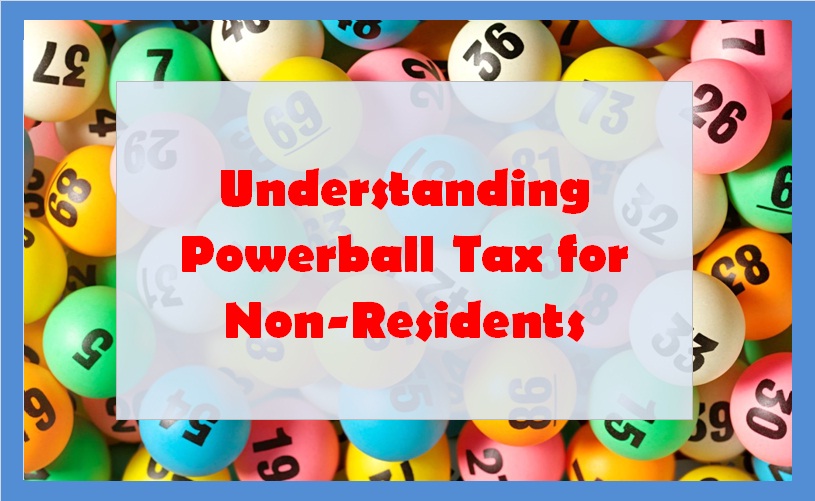Contents
Understanding Powerball Tax for Non-Residents
The allure of winning the Powerball jackpot can be irresistible, with dreams of financial freedom and exciting possibilities dancing in one’s mind. However, for non-residents who strike it lucky in the Powerball lottery, there are tax considerations that need careful attention. In this guide, we delve into the specifics of the Powerball tax for non-residents, shedding light on how much they might owe to the taxman upon hitting the jackpot.
Calculating Powerball Tax for Non-Residents:
1. Determining Non-Resident Status: Before we explore the intricacies of Powerball tax for non-residents, it’s crucial to establish whether you fall into the non-resident category according to IRS guidelines. Generally, non-resident aliens are subject to different tax rates and rules than U.S. citizens and resident aliens.
2. Federal Income Tax: Non-resident winners of the Powerball lottery are required to pay federal income tax on their winnings. The tax rate can vary depending on the amount won, ranging from 24% to 37%. These rates are subject to change based on the latest IRS regulations.
3. State Tax Considerations: In addition to federal tax, some states also impose their own taxes on lottery winnings. The applicable rates can differ significantly, and a few states exempt non-residents from these state-level taxes. It’s crucial to research the tax policies of the specific state in which the winning ticket was purchased.
4. Withholding at the Source: When non-resident individuals win the Powerball lottery, the IRS requires the lottery organizers to withhold 24% of the winnings for federal tax purposes. This withholding is a prepayment towards the winner’s tax liability.
5. Claiming Tax Treaty Benefits: Some non-resident winners might be eligible for reduced tax rates or exemptions based on tax treaties between their home country and the U.S. However, claiming treaty benefits can be complex, requiring careful documentation and adherence to treaty provisions.
6. Eligibility for Deductions: Non-residents often face limitations on the deductions they can claim against their lottery winnings. Unlike U.S. citizens, they might not be able to deduct losses against their winnings, which can impact their overall tax liability.
Reporting Requirements:
7. W-2G Form Issuance: Lottery organizers issue a W-2G form to winners, detailing the winnings and taxes withheld. Non-residents should ensure that the information on the form is accurate and matches their records.
8. Form 1040-NR Filing: Non-resident winners need to file a Form 1040-NR to report their lottery winnings and pay the applicable taxes. This form is specifically designed for non-residents’ tax reporting.
9. ITIN Application: If you don’t have a Social Security Number (SSN), you’ll need to apply for an Individual Taxpayer Identification Number (ITIN) to include on your tax forms.
10. Deadline and Penalties: Failing to meet tax filing deadlines can result in penalties and interest charges. Non-residents should be aware of these deadlines and strive to file their tax forms accurately and on time.
In conclusion, winning the Powerball lottery as a non-resident brings both excitement and tax responsibilities. Understanding the nuances of Powerball tax for non-residents is essential to ensure compliance with IRS regulations and to maximize your winnings. Always consult with tax professionals to receive accurate and personalized guidance based on your unique situation.
Summary Table:
| Aspect | Details |
|---|---|
| Determining Non-Resident Status | IRS guidelines for non-resident classification |
| Federal Income Tax | Varying rates based on winnings |
| State Tax Considerations | State-level taxes and exemptions |
| Withholding at the Source | 24% withholding by lottery organizers |
| Claiming Tax Treaty Benefits | Eligibility, documentation, and complexities |
| Eligibility for Deductions | Limitations on deduction claims |
| W-2G Form Issuance | Detailed reporting by lottery organizers |
| Form 1040-NR Filing | Specific tax form for non-resident reporting |
| ITIN Application | Applying for an ITIN if no SSN available |
| Deadline and Penalties | Importance of timely and accurate filing |
FAQs: Understanding Powerball Tax for Non-Residents:
Q1. Can non-residents participate in the Powerball lottery? A1. Yes, non-residents are allowed to purchase Powerball tickets and participate in the lottery.
Q2. How is federal tax on lottery winnings calculated for non-residents? A2. The federal tax rate varies based on the amount won, ranging from 24% to 37%.
Q3. Are state taxes the same for non-residents as they are for residents? A3. State tax policies can differ significantly for non-residents, and some states exempt them from certain taxes.
Q4. Can non-residents claim deductions for losses against their winnings? A4. Non-residents might face limitations on the deductions they can claim, unlike U.S. citizens.
Q5. What is the purpose of the W-2G form? A5. The W-2G form provides a detailed report of the winnings and taxes withheld for tax reporting purposes.
Q6. How do non-residents apply for an ITIN? A6. Non-residents can apply for an ITIN by submitting Form W-7 along with the required documents.
Q7. What happens if a non-resident misses the tax filing deadline? A7. Missing the tax filing deadline can lead to penalties and interest charges, so it’s crucial to file on time.
Q8. Can non-resident winners claim tax treaty benefits? A8. Yes, non-resident winners might be eligible for reduced tax rates or exemptions based on applicable tax treaties.
Q9. Is there a difference in tax treatment for U.S. citizens and non-residents winning the Powerball? A9. Yes, tax rates and rules differ for non-residents compared to U.S. citizens.
Q10. What if a non-resident holds dual citizenship with the U.S. and another country? A10. Dual citizenship can introduce complexities in tax treatment, and consulting with a tax professional is advisable.

